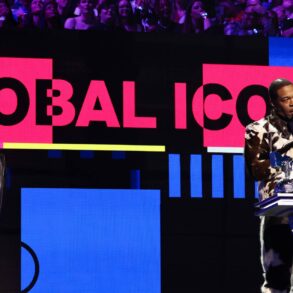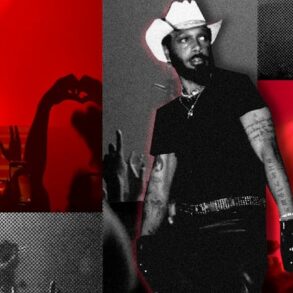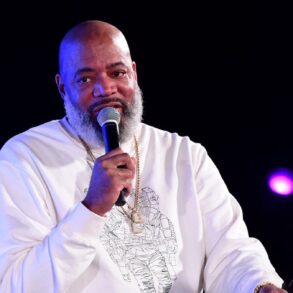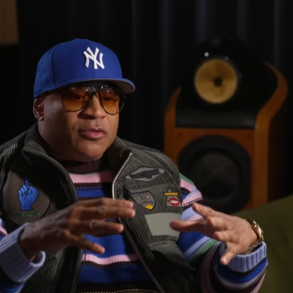OPINION: A conversation rumbling in the hip-hop community is one of separation between the older generation’s music and that of the younger generation. It has merit.
Editor’s note: The following article is an op-ed, and the views expressed are the author’s own. Read more opinions on theGrio.
I realize that I’m an old-head, especially for hip-hop purposes. I’m 45 and grew up on ’90s and 2000s hip-hop — all of my favorite hip-hop albums were released between 1991 and 2001. Despite my penchant for music released in the ’90s and ’00s, I am absolutely a fan of the current era of music. I think the younger artists nowadays are doing super creative things with sound and their voices. Almost daily, as I peruse curated playlists on various streaming services, I get introduced to new music that makes me smile; the kids are gonna be alright.
As is the case with the evolution of anything, as a new thing shows up, the older things get pushed further and further from view. That doesn’t mean the old guard isn’t still creating, but that those versions of the art that hold fast and true to the older way of doing things tend to become more niche than universally praised in the way that it once was.
Such is the case with hip-hop. While I do love the current era, I also understand why many my age don’t. Lyricism, once a hallmark of the very culture, isn’t the focal point. Rappers sing almost as much, if not more than they rap. Even the hardest of rappers are mostly singing songs, rapper style, with pitch correction and vocal effects. Of course, some of them are rapping, but it’s more of a meshing of styles and sounds than it is…”rapping.” The sound of hip-hop has also changed drastically. Because musical production is largely software-based at this point, there are more producers in the mix, and to older ears, a lot of the music sounds…similar. You can download a musical production app and make a full beat 10 minutes later. While this makes entry into the art form more accessible, it also means that anybody with a computer or phone (most people) can become producers. Some results are amazing — some not so much.
That also means that hip-hop, as a genre, now has a multitude of music and all of it falls under the same umbrella even if the sound is so varied that two artists who both do hip-hop might make music that exists in polar opposite sonic universes, but they’re both rapping. For many of us, there is a distinct difference between The Lox and Migos. Or Kendrick Lamar and Lil Yachty. Or J. Cole and Kodak Black. It’s like they’re making totally different music, but all are making music currently. Of course, some of the artists collaborate and find a way to make it work, but it is true that some of the music is just not the same, even if it’s all hip-hop.
So when 9th Wonder, the famed music producer, teacher, DJ and hip-hop historian tweeted that it was time for an adult contemporary category in hip-hop, he was echoing a thought and conversation that has been had by many of us who grew up in hip-hop of what feels like an entirely different era…and goal.
9th Wonder’s July 2024 tweet came on the heels of a joint album from rap legends, rapper Common and producer Pete Rock. The album is fun and speaks to a certain generation of rap fans. It contained the boom-bap and lyricism that those of us who came of age in the ’90s recognize. The album is built on the beats, rhymes and life formula that was the essence of the culture. The album sounds good in 2024, when it was released, but could have existed in prior eras just as easily. I think that’s the point 9th Wonder was pointing out. So many musical genres allow their music to be split into categories that more aptly fit the sound or era in which something was created. I might not be able to define yacht rock, but I know yacht rock when I hear it. Heavy metal, country, classical, etc. are all genres that have subgenres that allow for the art to exist in a space where it’s most understood as opposed to dismissing it for being old or non-mainstream for the time.
Music
To me, it just makes sense to allow for some variation in the way we categorize releases. It doesn’t take away from the culture, it acknowledges that hip-hop has been around long enough and has many different ways to exist. It’s not divisive, it’s…evolution. And even if we don’t formally create subgenres of hip-hop, for award purposes and other things, they exist anyway; just as much as the older of us hip-hop fans complain about the new crop of artists and sounds, the young people aren’t exactly chomping at the bit to return to a sound that was already on its way out when they were born.
Now some people may want divisions in hip-hop to differentiate the music they love from music they don’t, which isn’t great but is human nature. But the truth is, hip-hop of the ’90s was different from the ’80s and there was some trepidation about the direction early ’90s artists were taking the music. The conversations about labels and categories of hip-hop have always existed, from gangsta rap (which seemed to have been welcomed by some) to conscious rap (which was eschewed by many rappers who didn’t want to be boxed into some label that created some, at times, unattainable expectations). Trap rap and emo rap are the sound of the day.
I don’t know if we need to break hip-hop into categories solely for award purposes so rappers who would never listen to one another or perform on the same stages aren’t competing for the same awards, but I see no harm in allowing the natural course of music and sound to happen. The popularity of newer artists does make it harder for music that follows a more “traditional” sound to take up space. Maybe 9th Wonder thinks that Common and Pete Rock’s album “The Auditorium Vol. 1” needs to sweep all of the awards possible so we need a category for it to be able to do so. I don’t even know what awards this could pertain to. Or if this just a call to get adult contemporary radio stations and such on terrestrial radio that play Mobb Deep, Stalley, OutKast, Jean Grae and The Fugees, all day?
It’s a fun thought exercise at least. Hip-hop has a lot of tentacles, I see no harm in acknowledging and operating in a way that celebrates them all.
Panama Jackson is a columnist at theGrio and host of the award-winning podcast, “Dear Culture” on theGrio Black Podcast Network. He writes very Black things, drinks very brown liquors, and is pretty fly for a light guy. His biggest accomplishment to date coincides with his Blackest accomplishment to date in that he received a phone call from Oprah Winfrey after she read one of his pieces (biggest) but he didn’t answer the phone because the caller ID said “Unknown” (Blackest).
More must-reads:
This post was originally published on this site be sure to check out more of their content.








